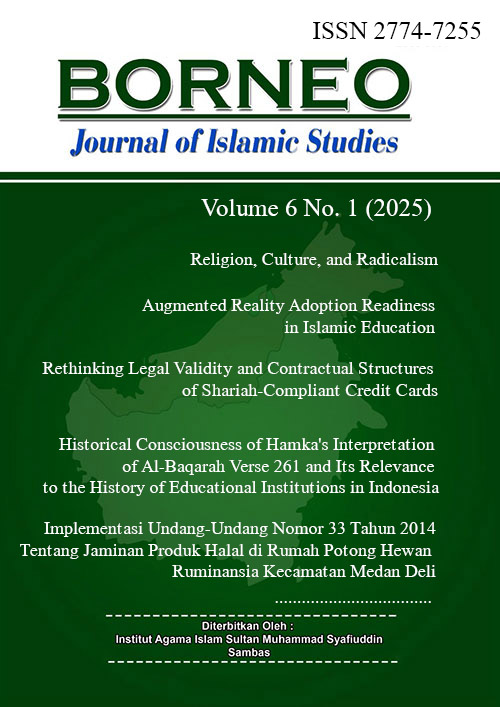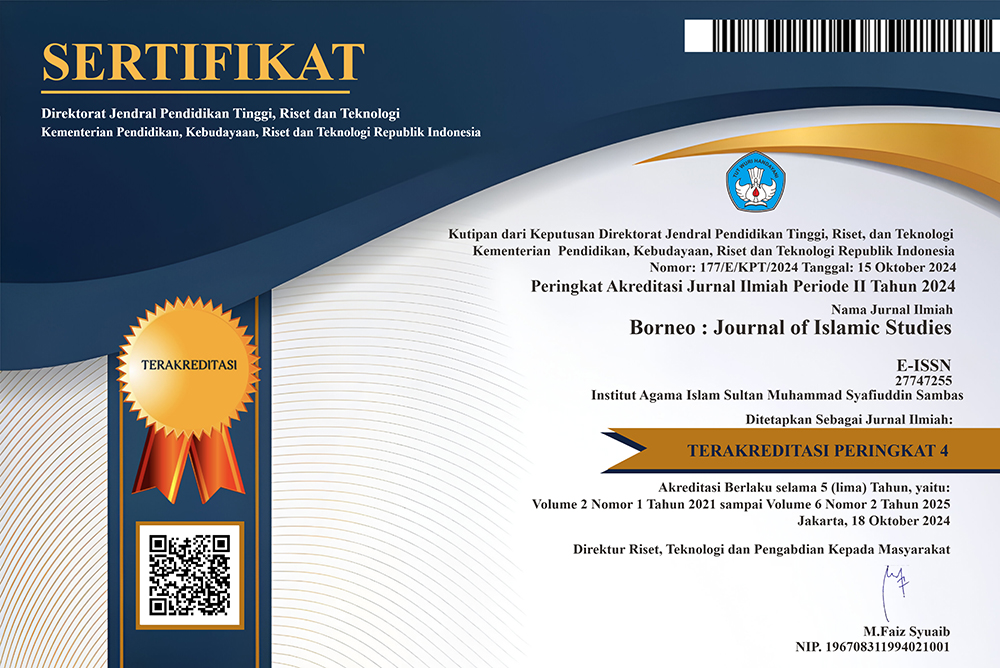Augmented Reality Adoption Readiness in Islamic Education
A Comparative Study in MI Al Huda Kebonsari, Indonesia and Chariyathamsuksa School, Thailand
Abstract
The integration of immersive technologies such as Augmented Reality (AR) presents unique opportunities and challenges for Islamic educational institutions. This research aims to fill this gap by conducting a multi-dimensional comparative analysis of AR adoption readiness at two Islamic educational institutions in Southeast Asia: MI Al Huda Kebonsari, Indonesia, and Chariyathamsuksa Foundation School, Thailand. Using a qualitative comparative case study approach, this study analyzes data from in-depth interviews, observations, and document analysis through a multi-layered analytical framework comprising the Education Technology Readiness Index (ETRI) for institutional capacity (macro), the Unified Theory of Acceptance and Use of Technology (UTAUT) for behavioral drivers (meso), and the Technology Readiness Index (TRI) for psychological dispositions (micro). The results reveal two distinct readiness profiles: MI Al Huda demonstrates a "policy-driven" readiness, characterized by a strong managerial vision but hampered by infrastructural resource limitations. Conversely, Chariyathamsuksa exhibits an "opportunity-driven" readiness, excelling in material resources due to external partnerships but facing challenges in institutionalizing innovation for long-term sustainability. This study concludes that true technological readiness is a complex socio-technical phenomenon, requiring simultaneous attention to infrastructure, perception, and mindset to ensure that technology is not only adopted but also wisely integrated to strengthen the core mission of Islamic education in shaping a generation of noble character.
References
Cufuna, D. S. A., Rangel-de Lazaro, G., & Duart, J. M. (2025). Exploring the role of didactic strategies in the creation of augmented reality digital content by pre-service primary school teachers: A systematic literature review. Journal of Digital Learning in Teacher Education, 41(2–3), 129–145. https://doi.org/10.1080/21532974.2025.2511600
Ewais, A., Dalipi, F., Abualrob, M., Ferati, M., & Kurti, A. (2025). Assessing the Teachers’ Readiness for Integrating Augmented Reality in K-12 Education: A Comparative Analysis . International Journal of Interactive Mobile Technologies (iJIM), 19(05), pp. 22–44. https://doi.org/10.3991/ijim.v19i05.51505
Kazlaris, G. C., Keramopoulos, E., Bratsas, C., & Kokkonis, G. (2025). Augmented Reality in Education Through Collaborative Learning: A Systematic Literature Review. Multimodal Technologies and Interaction, 9(9), 94. https://doi.org/10.3390/mti9090094
Lateh, F., Fatkuroji., & Lateh, A. (2025). Transformasi Digital Sebagai Revitalisasi Budaya Kerja Dalam Good Institutional Governance di FITK Walisongo Semarang, Indonesia dan Thailand Selatan. QUALITY: JURNAL PENELITIAN EMPIRIS DALAM PENDIDIKAN ISLAM, 13(1), 57-74. https://doi.org/10.21043/quality.v13i1.31157
Marikyan, D.& Papagiannidis, S. (2025) Unified Theory of Acceptance and Use of Technology: A review. In S. Papagiannidis (Ed), TheoryHub Book. Available at https://open.ncl.ac.uk / ISBN: 9781739604400
Marrahi-Gomez, Victor & Belda-Medina, Jose. (2022). The Integration of Augmented Reality (AR) in Education. Advances in Social Sciences Research Journal. 9. 475-487. 10.14738/assrj.912.13689.
Parasuraman, A Parsu. (2000). Technology Readiness Index (Tri): A Multiple-Item Scale to Measure Readiness to Embrace New Technologies. Journal of Service Research - J SERV RES. 2. 307-320. 10.1177/109467050024001.
Parasuraman, A., & Colby, C. L. (2014). An Updated and Streamlined Technology Readiness Index: TRI 2.0. Journal of Service Research, 18(1), 59-74. https://doi.org/10.1177/1094670514539730
Quintero, J., Baldiris, S., Rubira, R., Cerón, J., & Velez, G. (2019). Augmented Reality in Educational Inclusion. A Systematic Review on the Last Decade. Frontiers in psychology, 10, 1835. https://doi.org/10.3389/fpsyg.2019.01835
Sabiteka, M., Yu, X., & Sun, C. (2025). Toward Sustainable Education: A Contextualized Model for Educational Technology Adoption for Developing Countries. Sustainability, 17(8), 3592. https://doi.org/10.3390/su17083592
Salim, M. A., & Aditya, R. B. (2025). Integration of Artificial Intelligence in Islamic Education: Trends, Methods, and Challenges in the Digital Era. Journal of Modern Islamic Studies and Civilization, 3(01), 74–89. https://doi.org/10.59653/jmisc.v3i01.1368
Sanzi, V., & Kurniawan, M. A. (2025). Literatur Analisis on the Utilization of PAI Learning Media Applications: A Study of Opportunities and Challenges in Secondary Schools. Didaktika: Jurnal Kependidikan, 14(2), 3335–3344.
Sholeh, Muh. (2023). Technology Integration in Islamic Education: Policy Framework and Adoption Challenges. Journal of Modern Islamic Studies and Civilization. 1. 82-100. 10.59653/jmisc.v1i02.155.
Singh, S., Kaur, A., & Gulzar, Y. (2024). The impact of augmented reality on education: a bibliometric exploration. Frontiers in Education, 9, 1458695. https://doi.org/10.3389/feduc.2024.1458695
Siregar, H.S., Nurhamzah, N., Munir, M., & Fikri, M. (2025). Enhancing Islamic Education through Technology Integration: A Study of Teaching Practices in Indonesia. Jurnal Ilmiah Peuradeun, 13(2), 959-986. https://doi.org/10.26811/peuradeun.v13i2.1875
Soares, A., Lerigo-Sampson, M., & Barker, J. (2024). Recontextualising the Unified Theory of Acceptance and Use of Technology (UTAUT) framework to higher education online marking. Journal of University Teaching and Learning Practice, 21(8). https://doi.org/10.53761/7ft8x880
Suraijiah, Rusdiana, Rusdiah, M. Ramli, & Murdan. (2023). The Effectiveness of Using Media Technology in Islamic Religious Education in an Independent Curriculum: Technocultural Study of Religious Education . Jurnal Iqra’ : Kajian Ilmu Pendidikan, 8(1), 335–349. https://doi.org/10.25217/ji.v8i1.2760
Tim Penjamin Mutu Madrasah Ibtidaiyah Al Huda Kebonsari. (2025). Kurikulum Operasional Madrasah Tahun Pelajaran 2024-2025.
Unesco (2023) Technology in education: a case study on Indonesia. https://unesdoc.unesco.org/ark:/48223/pf0000387827
World Bank. (n.d.). The EdTech Readiness Index (ETRI). https://www.worldbank.org/en/topic/education/brief/edtech-readiness-index
Copyright (c) 2025 Habib Rachman Wafiq, Prawidya Lestari, Asiyah Aksorn

This work is licensed under a Creative Commons Attribution-ShareAlike 4.0 International License.








.png)



